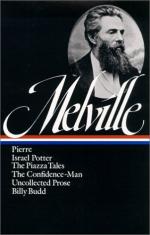The sun was now calmly setting over the green land of Ireland. The sky was serene, the sea smooth, the wind just sufficient to waft the two vessels steadily and gently. After the first firing and a little manoeuvring, the two ships glided on freely, side by side; in that mild air Exchanging their deadly broadsides, like two friendly horsemen walking their steeds along a plain, chatting as they go. After an hour of this running fight, the conversation ended. The Drake struck. How changed from the big craft of sixty short minutes before! She seemed now, above deck, like a piece of wild western woodland into which choppers had been. Her masts and yards prostrate, and hanging in jack-straws; several of her sails ballooning out, as they dragged in the sea, like great lopped tops of foliage. The black hull and shattered stumps of masts, galled and riddled, looked as if gigantic woodpeckers had been tapping them.
The Drake was the larger ship; more cannon; more men. Her loss in killed and wounded was far the greater. Her brave captain and lieutenant were mortally wounded.
The former died as the prize was boarded, the latter two days after.
It was twilight, the weather still severe. No cannonade, naught that mad man can do, molests the stoical imperturbability of Nature, when Nature chooses to be still. This weather, holding on through the following day, greatly facilitated the refitting of the ships. That done, the two vessels, sailing round the north of Ireland, steered towards Brest. They were repeatedly chased by English cruisers, but safely reached their anchorage in the French waters.
“A pretty fair four weeks’ yachting, gentlemen,” said Paul Jones, as the Ranger swung to her cable, while some French officers boarded her. “I bring two travellers with me, gentlemen,” he continued. “Allow me to introduce you to my particular friend Israel Potter, late of North America, and also to his Britannic Majesty’s ship Drake, late of Carrickfergus, Ireland.”
This cruise made loud fame for Paul, especially at the court of France, whose king sent Paul, a sword and a medal. But poor Israel, who also had conquered a craft, and all unaided too—what had he?
CHAPTER XVIII.
THE EXPEDITION THAT SAILED FROM GROIX.
Three months after anchoring at Brest, through Dr. Franklin’s negotiations with the French king, backed by the bestirring ardor of Paul, a squadron of nine vessels, of various force, were ready in the road of Groix for another descent on the British coasts. These craft were miscellaneously picked up, their crews a mongrel pack, the officers mostly French, unacquainted with each other, and secretly jealous of Paul. The expedition was full of the elements of insubordination and failure. Much bitterness and agony resulted to a spirit like Paul’s. But he bore up, and though in many particulars the sequel more than warranted his misgivings, his soul still refused to surrender.




